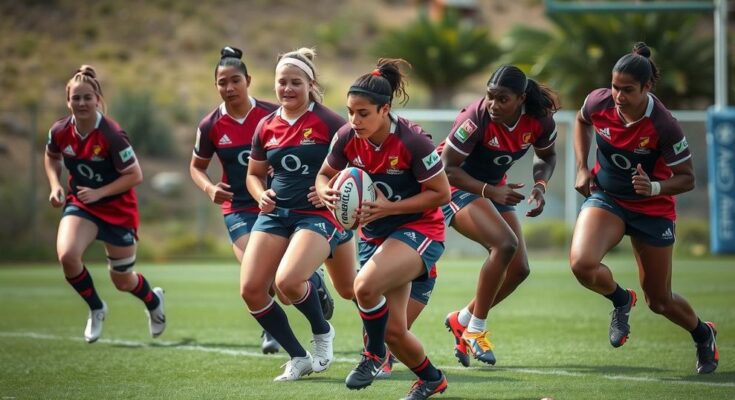Women’s rugby in South Africa faces considerable challenges despite the success of the Springbok Women. Timmy Goodwin, the Lions Women’s coach, highlights persistent funding issues and the need for professionalization. Currently ranked 12th globally, the Springbank Women’s team has historically struggled and is on the brink of stagnation compared to successful programs in other nations. Efforts must focus on enhancing support, sponsorship, and grassroots development to empower future players and elevate the game.
In South Africa, the progress of women’s rugby remains stagnant despite the recent achievements of the Springbok Women, who have risen to prominence. The domestic level of the sport continues to be regarded as an extraneous expenditure, with many challenges impeding its advancement. Timmy Goodwin, coach of the Lions Women, highlighted the substantial hurdles faced in elevating the women’s game over the past seven years.
Currently ranked 12th by World Rugby, the Springbok Women have historically struggled, never surpassing a 10th rank and failing to advance past the pool stage in World Cup competitions. Their recent performance in the WXV2 tournament saw a decline, finishing fourth in their group. This situation underscores a significant imbalance compared to successful women’s rugby initiatives globally, particularly in nations like Australia and New Zealand, where women’s rugby has enjoyed greater recognition and support for decades.
In South Africa, the women’s sector has only recently received attention, launching their first Test match in 2004. The domestic arena reveals a pronounced disparity, with teams such as the Bulls and Boland possessing fully contracted squads, while others, like the Lions, remain amateur and rely heavily on union support. Goodwin emphasized the urgent need for professionalization of the women’s game, stating that enhancing broadcasting, attracting sponsorship, and providing essential support services are critical to its growth.
The Lions’ program, although benefiting from prior sponsorships, faces challenges post-2023 season, necessitating reliance on the union. SA Rugby’s initiative to establish a Women’s Super League Rugby by 2025 represents progress, yet significant logistical considerations must be addressed. Furthermore, the growth of rugby at grassroots levels is hampered by financial limitations faced by players from disadvantaged backgrounds. Despite these obstacles, the Lions have seen success in youth competitions and are dedicated to nurturing future talent, maintaining twelve clubs in their women’s league and eighteen junior teams.
The state of women’s rugby in South Africa highlights a significant disparity in funding and recognition compared to the men’s game, revealing systemic challenges that have persisted for years. Although the Springbok Women have recently achieved notable success, their historical underperformance at international levels illuminates the necessity for structural changes and increased financial support. Timmy Goodwin’s insights as the Lions Women’s coach elucidate the urgency for professionalization and expansion of resources in the women’s game to mitigate these challenges and promote equitable growth. Without such interventions, the gap between South Africa and other nations’ women’s rugby programs will continue to widen.
The narrative surrounding women’s rugby in South Africa is one of both potential and struggle. Despite the triumphs of the Springbok Women and emerging talent at the grassroots level, significant improvements are necessary to professionalize the sport comprehensively. The remarks of Timmy Goodwin encapsulate the pressing need for financial backing, sponsorship, and infrastructural support to elevate the women’s game and enable it to compete globally. Only through committed effort and investment can South Africa’s women transform their game from an overlooked aspect to a respected arena of athletic achievement.
Original Source: rugby365.com




